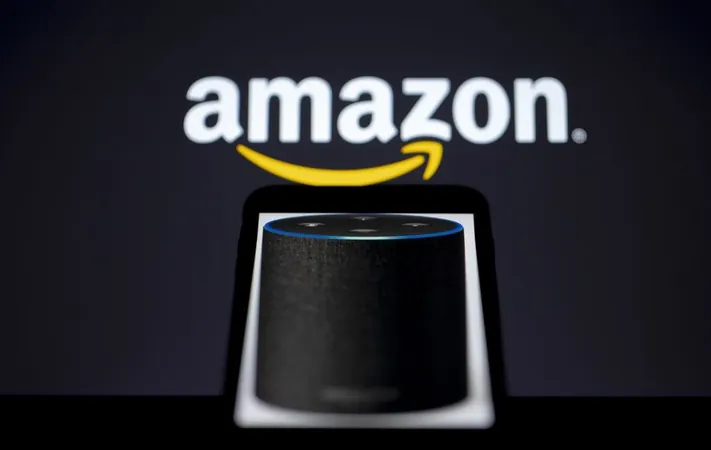
Amazon's Race Against Time: Can Alexa Overcome the Hallucination Hurdle?
2025-01-14
Author: Ken Lee
Introduction
Amazon is on the brink of a major transformation for its Alexa voice-powered assistant, aiming to enhance it with advanced artificial intelligence capabilities that could redefine how users interact with technology. However, the tech giant is facing significant challenges that must be addressed before this ambitious relaunch can take place.
Current State of Alexa
For the past two years, Amazon has been tirelessly working to integrate generative AI into Alexa, which is currently embedded in over 500 million devices globally. The company, valued at a staggering $2.4 trillion, envisions turning Alexa from a simple task performer—like playing music or setting alarms—into a smart, personalized concierge capable of handling a wide array of functions, from recommending restaurants to automating home lighting based on sleep patterns.
The Hallucination Problem
According to Rohit Prasad, who leads Amazon's artificial general intelligence (AGI) team, the rollout is contingent upon solving several critical technical issues. Among the most pressing is the so-called “hallucination” problem—instances where the AI generates false or misleading information. "Hallucinations have to be close to zero," Prasad emphasized, acknowledging that this is an ongoing challenge not just for Alexa, but across the entire AI industry.
Competition and Industry Pressure
The urgency for Alexa's redesign heightened after the release of OpenAI's ChatGPT in late 2022, a competitor that has set high expectations for conversational AI. As companies like Microsoft and Google rapidly integrated generative AI into their platforms, the scrutiny on Amazon’s ability to keep pace has intensified. There are concerns within the industry about whether Amazon can effectively navigate the complexities inherent in its systems to deliver an AI assistant that meets consumers' expectations.
Challenges in Development
Challenges reported by past employees indicate that the transition from a straightforward question-and-answer format to an advanced conversational agent is fraught with complications. Legacy systems built on outdated algorithms struggle to blend with more sophisticated models. Current attempts to reinvent Alexa incorporate various AI models, including Amazon’s own Nova models and Claude from Anthropic, which Amazon has heavily invested in.
Integration and Functionality
Prasad shared insights on the scale of integration necessary for Alexa to function effectively as an intelligent agent. “The sheer number of services integrated into Alexa is massive,” he said. He highlighted the difficulty in balancing quick response times with the accuracy needed for user trust, given the unpredictable nature of generative AI.
Maintaining Original Features
Moreover, there is an ongoing concern about retaining Alexa's original functionality and reliability while infusing it with new generative features. To address this, Amazon is committing to hiring experts to refine the assistant's voice and interaction style, ensuring it remains familiar to users. Former team members have warned that as sophisticated as large language models are, they can produce “completely invented” answers, risking Amazon's brand reputation.
Internal Criticism and Frustration
Criticism has been levelled at Amazon from within its ranks, suggesting that the company has fallen behind in the conversational AI race, despite its resources and talent pool. Technical and bureaucratic obstacles have exacerbated delays, and maintaining a cohesive development strategy has proven difficult, resulting in frustration among third-party developers eager to innovate new features for Alexa.
The Future of Alexa
As the clock ticks, Amazon's Alexa team faces the dual challenge of technical reliability and monetization. Strategies under consideration include a subscription service or revenue-sharing models with developers.
Conclusion
Prasad concluded by reaffirming the company's commitment to customer impact rather than engaging in futile scientific pursuits. "What we are always grounded on is practical AI," he stated. "In this era of generative AI, delivering customer value and ROI is becoming paramount." With a mountain of hurdles ahead, the question looms: can Amazon solve the hallucination problem and truly reinvent Alexa as the AI assistant of the future? The world is watching.



 Brasil (PT)
Brasil (PT)
 Canada (EN)
Canada (EN)
 Chile (ES)
Chile (ES)
 Česko (CS)
Česko (CS)
 대한민국 (KO)
대한민국 (KO)
 España (ES)
España (ES)
 France (FR)
France (FR)
 Hong Kong (EN)
Hong Kong (EN)
 Italia (IT)
Italia (IT)
 日本 (JA)
日本 (JA)
 Magyarország (HU)
Magyarország (HU)
 Norge (NO)
Norge (NO)
 Polska (PL)
Polska (PL)
 Schweiz (DE)
Schweiz (DE)
 Singapore (EN)
Singapore (EN)
 Sverige (SV)
Sverige (SV)
 Suomi (FI)
Suomi (FI)
 Türkiye (TR)
Türkiye (TR)
 الإمارات العربية المتحدة (AR)
الإمارات العربية المتحدة (AR)